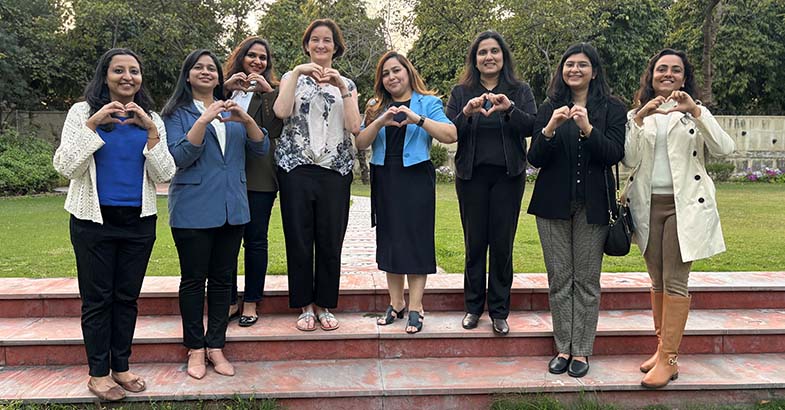
As part of the ‘Meet with a LeadHer’ series, organised in the run-up to International Women’s Day, I had the opportunity to interact with Christina Scott, British Deputy High Commissioner to India in New Delhi.
The evening commenced with a welcoming greeting from Christina, who awaited our group at the gates of the British High Commission in Delhi and graciously ushered us into her charming bungalow with a warmth that put us at ease. Initiating the conversation with an introduction of herself, she recounted her career spanning over 25 years, including notable experiences in China, Anguilla, and most recently, India; painting a vivid picture of her journey through various cultures and professional endeavours and some challenging times (such as Covid).
The conversation flowed effortlessly over tea, with Christina fostering an atmosphere of openness and inclusion. She encouraged everyone to share their perspectives, leading to discussions on a range of topics, from the British government’s commitment to education and bilateral investments to trade, commerce, and healthcare initiatives. Of particular interest to Christina was the exploration of women’s experiences in the Indian workplace. The group delved into successes and pondered a pivotal question: How can we accelerate women’s participation in India’s labour force? It was evident that Christina personally felt strongly on this subject and was a passionate advocate for inclusive work environments. She underscored the significance of nurturing a culture that addresses the needs of all individuals, irrespective of gender, race, or background. She stressed that a workplace that acknowledges and caters to the diverse needs of every demographic fosters a culture of empowerment, allowing its workforce to flourish and soar.
At the heart of her perspective on this matter lay a poignant question: “Can a woman, experiencing menopause, breastfeeding, or requiring time off for childbirth, find a safe, inclusive, and non-judgmental space in her workplace? Doesn’t the burden of responsibility lie on the workplace, rather than the individual, to adapt and cater to the needs of its workforce?”
As the conversation ebbed and flowed, one striking aspect was the motivation Christina shared behind her decision to pursue a career in diplomacy. Rooted in a profound desire to make a difference in the lives of others, her inspiration draws from her father’s role in the clergy and his life spent helping others. Christina aspires to leverage her positive presence to build and grow collaborative work between the British and Indian governments; her candid acknowledgment of her influence and responsibility was both genuine and humbling.
In terms of Christina’s primary areas of focus: the topic of education featured prominently, including fostering robust bilateral ties between the two nations, particularly to enhance and expand educational exchanges. Christina hoped that she could promote an increase in the establishment of educational institutions in India with support from the UK and facilitate a balanced flow of students and young professionals between the two countries. She highlighted the need to address the relatively low influx of professionals from the UK to India by defining clear pathways for career opportunities, such as identifying colleges for exchange programs or attractive job prospects (in India).
Currently, she noted, professionals from the UK may find it daunting to pursue careers in India, resulting in a predominantly unidirectional flow of students from India to the UK- a matter she hoped to change in the near future.
Additionally, Christina discussed various other areas of mutual interest, including trade, where efforts are underway to bolster investments from India into the UK while simultaneously facilitating and promoting British investments in India. In the realm of healthcare, she underscored India’s significant potential as a producer, for example, of pharmaceutical active ingredients, expressing hope for further development in this and related areas. Furthermore, she highlighted the contributions of world-class medical professionals from India to the UK and emphasised ongoing efforts to recruit more talent from the country to meet the demands of the healthcare sector.
Christina demonstrated keen intelligence and a strong grasp of current affairs, highlighted by her precise citation of facts and figures from the recent NHFS (National Family Health Survey) and women’s labour force participation reports from India during our conversation. She is clearly one who is rooting for the India story and a well-wisher (on a lighter note, she mentioned her love for yoga and travel with a goal to visit ALL 30+ UNESCO world heritage sites in the country!)
By the end of the hour, the group was refreshed and inspired by Christina’s contagious energy, sincere humility, and her talent for drawing out heartfelt conversations from each of us. We parted ways with a sense of having known each other for much longer, bidding farewell with the warmth and comfort of old acquaintances.
Thank you, Christina. The hour you spent with us was enlightening, introspective, and honest; we will cherish this conversation for a long time to come!
Organised by the offices of External Relations and Alumni Engagement, ‘Meet with a LeadHer’ is a series of interactive lunch/coffee meets where a woman leader shares perspectives on their journey and achievements with the ISB community.

